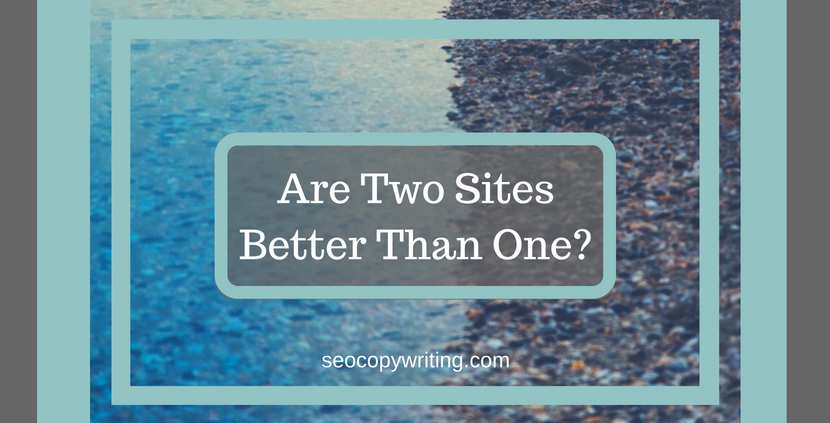Are Two Sites Better Than One?
Every once in awhile, someone will call me with this great, “guaranteed not to fail” idea.
The conversation goes something like this.
“Why don’t we build out another site, write a whole bunch of new, optimized content and target the same keyphrases. That way, BOTH sites can position in Google, and we can dominate the search listings. Cool idea, eh?”
Unfortunately, I tend to be the cold, dreary rain on their SEO parade.
This strategy can be a cool idea — for the right reasons.
But, if you’re doing this purely for SEO, splitting your site will be a major hassle for little return.

Here’s why…
Twice the sites can mean triple the efforts
Think about your current site (or your clients’ sites.) How much content do you produce a month? How are you promoting it on social media? How long does everything take — and how much does it cost?
Building a brand-new site just for Google means tripling your efforts, costs and output. It means a new wireframe, a new design, and new technology to manage.
Plus, it takes a long time for new sites to position, even if there’s a solid content strategy in place. Assuming the site does position.
Many times, the ROI never pencils out.
What does Google say?
The SEM Post reported how Google’s John Mueller had this to say during a Twitter chat:
“If you split a site into two sites, each site will have to rank on its own. That can result in the 2 sites not being as visible in search (or as much traffic) as the single old site (eg, very simplified: 2x page 2 probably gets fewer visits than 1x page 1).”
So, if you’re splitting out your existing site — or creating a new site “just for Google,” you may be creating more trouble than it’s worth.
You have been warned. :)
But (because there’s always a but…)

Some companies create multiple sites because it makes sense for their customers. For instance, a company may have separate sites for B2B and B2C customers.
Or, a company may offer a new service/product that’s completely unrelated to their main target audience — so, a new site makes sense. For instance, my coaching site will be a brand-new site. It won’t have anything to do with SEO writing.
Or, a company may have another, technical reason. My SEO Content Institute site is where my products (and training back-end) live. It used to be all under my SEO Copywriting domain, but selling products AND services AND the training/technical back-end caused things to be confusing. And break. A lot.
As you may have noticed, I am the queen of multiple sites — but, I do it because it makes business sense. Not for Google.
And yes, it’s a pain to manage multiple sites. :)
What do you think?
When I first talked about multiple sites in my newsletter, many subscribers emailed me saying, “Yes, our company has multiple sites, and its a nightmare.” Sometimes, the multiple site strategy was for SEO. Sometimes, the powers-that-be thought it was a “good idea” to build something new.
In almost all cases, unless there was a compelling business purpose, the ROI wasn’t there.
But, what do YOU think? What do you see? Leave a comment below and let me know what’s on your mind. I’d love to get your take.




This question comes up a lot in a business group that I belong to. I think it makes sense to have multiple sites when they serve different functions (blog vs. e-commerce) or when they are in different niches. But, I agree with you, running multiple websites is a lot of work, and the additional expenses can add up quickly. If you’re only doing it for SEO — stick with one.